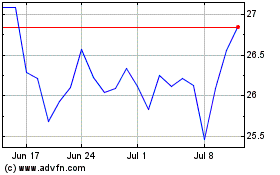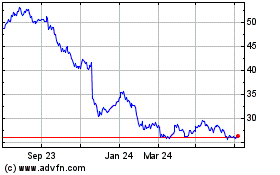Judge Questions Bayer's Roundup Settlement Plan
July 07 2020 - 1:43PM
Dow Jones News
By Sara Randazzo
A federal judge cast doubt on Bayer AG's proposal to neatly
resolve all future lawsuits over the safety of its Roundup
weedkiller, potentially snagging the German company's attempts to
move past the massive liability.
Bayer said recently it would pay up to $10.9 billion to settle
tens of thousands of current Roundup cases and create a system for
handling future cases. The deal came after three juries in recent
years awarded large verdicts to plaintiffs alleging Roundup caused
non-Hodgkin lymphoma, spooking investors.
But with Roundup still being sold and no plans to change the
label or active ingredients, settling the litigation isn't as easy
as paying those who have already sued. Bayer proposed a novel type
of class action to capture all future claims, which would be guided
by the conclusions of a court-approved panel of scientists chosen
to study Roundup's potential carcinogenicity.
U.S. District Judge Vince Chhabria in San Francisco, who must
approve the class action, said Monday he was skeptical of the plan
and likely to reject the idea. In a four-page order refusing to
delay a July court hearing in the case, he questioned "whether it
would be constitutional (or otherwise lawful)" to hand the issue to
a panel of scientists instead of judges and juries.
The company's shares fell by 5% Tuesday in Europe.
"In an area where the science may be evolving, how could it be
appropriate to lock in a decision from a panel of scientists for
all future cases?" the judge wrote. Bayer had proposed giving the
panel four years to study existing research on whether Roundup and
its active ingredient, glyphosate, cause cancer.
Meanwhile, no one could bring new Roundup lawsuits, and if the
panel found the weedkiller to be safe, it would essentially shut
down any future cases. If the panel concluded Roundup was dangerous
at certain exposure levels, lawsuits could go ahead, but those
suing couldn't seek any punitive damages.
The judge said he also found it "dubious" that news of the class
action could possibly reach all farmer workers, gardeners and other
Roundup users who haven't gotten cancer yet and may want to
sue.
Judge Chhabria said a July 24 hearing will go ahead, nothing
that "if the parties are going to need to move to Plan B, they
would presumably prefer to do that sooner rather than later."
Bayer said Tuesday: "We appreciate the Judge's order raising his
preliminary concerns with the proposed class settlement, which we
take seriously" and will address at the hearing.
"Shareholders want finality, they want certainty, they want the
Roundup ordeal to be over," said Tom Claps, an analyst at
Susquehanna Financial Group. At the same time, he said, "investors
have always known there's no neat bow and ribbon that they could
wrap up around future claims to provide full closure for the
company." Mr. Claps said the company could try to tweak the
proposal to meet the judge's approval, but that it appeared
unlikely to go through otherwise.
Bayer had proposed setting aside $1.1 billion as part of the
class action, to go toward tools to diagnose non-Hodgkin lymphoma
and relief payments to low-income plaintiffs. Another $150 million
would go toward attorneys' fees.
Bayer inherited the Roundup litigation in its 2018 acquisition
of U.S. agricultural giant Monsanto Co. The recent settlement of
existing cases, which doesn't need a court's approval, will cost
the company between $8.8 billion and $9.6 billion.
Write to Sara Randazzo at sara.randazzo@wsj.com
(END) Dow Jones Newswires
July 07, 2020 13:28 ET (17:28 GMT)
Copyright (c) 2020 Dow Jones & Company, Inc.
Bayer (TG:BAYN)
Historical Stock Chart
From Mar 2024 to Apr 2024

Bayer (TG:BAYN)
Historical Stock Chart
From Apr 2023 to Apr 2024
